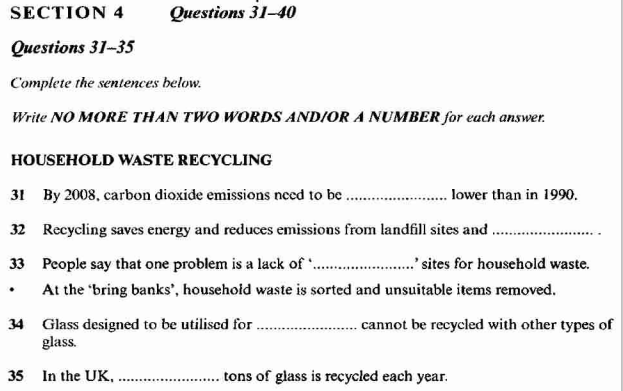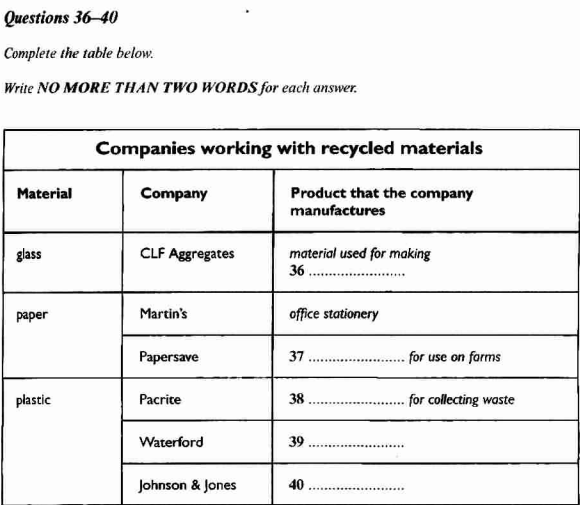剑桥雅思5:Test3雅思听力SECTION 4真题+答案+解析
发布时间:2020-10-12 关键词:剑桥雅思5:Test3雅思听力SECTION 4真题+答案+解析为帮助同学们学习,小编为大家整理了剑桥雅思5:Test3雅思听力SECTION 4真题、答案、解析,希望能够对大家有帮助,雅思听力SECTION 4是最难的题目,希望大家能重点掌握。关于剑桥雅思的资讯关注新航道北京学校剑桥雅思栏目。
Well, my group has been doing a project on how houschold waste is recycledin Britain.
We were quite shocked to discover that only 9% of people here in the UKmake an effort to recycle their household waste. This is a lower figure than inmost other European countries, and needs to increase dramatically in the nextfew years if the government is going to meet its recycling targets.
The agreed targets for the UK mcan that by 2008 we must reduce our
carbon dioxide emissions by 12.5%. compared with 1990. And recycling canhelp to achieve that goal, in two main ways: the production of recycled glassand paper uses much less energy than producing them from virgin materials,and also rccycling rcduccs greenhouse gas emissions from landfill sites andincineration plants.
As part of our project, we carrild out a survey of people in the street, andthe thing that came up over and over again is that people don't think it's easyenough to recycle their waste. One problem is that there aren't enough "drop-ofr sites, that is, the places where the public are supposed to take their waste.
We also discovered that waste that's collected from householders is taken toplaces called 'bring banks', for sorting and baling into loads. One problemhere is taking out everything that shouldn't have been placed in the recyclingcontainers: people put all sorts of things into bottle banks, like plastic bagsand even broken umbrellas All this has to be removed by hand. Anotherdificulty is that toughened glass used for cooking doesn't fully melt at thetemperature required for other glass, and so that also has to be picked out byhand.
Glass is casy to recycle because it can be reused over and over again withoutbecoming weaker. Two million tons of glass is thrown away each year, that is,seven billion bottles and jars; but only 500.000 tons of that is collected andrecycled.
Oddly enough, half the glass that's collected is green, and a lot of that is
imported, so more grecn glass is recycled than the UK needs. As a result, newuses are being developed for recycled glass, particularly green glass, for examplein fbreglass manufacture and water filtration. A company called CLF
Aggregates makes a product for roads, and 30% of the material is crushed glass.For recycling paper, Britain comes second in Europe with 40%, behind
Germany's amazing 70%.
When recycling started, there were quality problems, so it was difficult touse recycled paper in office printers, But these problems have now been solved,and Martin's, based in South London, produces a range of office stationerywhich is 100% recycled, costs the same as normal paper and is of equally highquality.
But this high quality comes at a cost in terms of the waste produced duringthe process. Over a third of the waste paper that comes in can't be used in therecycled paper, leaving the question of what to do with it. One firm, Papersave,currently sells this to farmers as a soil conditioner, though this practice willsoon be banned because of transport costs and the smell, and the company islooking into the possibility of alternative uses.
Plastic causes problems, because there are so many diflerent types of plasticin use today. and each one has to be dealt with differently. Pacrite recycles allsorts of things, from bottles to car bumpers, and one of its most successfulactivities is recycling plastic bottles to make containers which are used all overthe country to collect waste.
The Save-a-Cup scheme was set up by the vending and plastics industries torecycle as many as possible of the three and-a-half billion polystyrene cupsused cach year. At the moment 500 million polycups are collected, processedand sold on to other businesses, such as Waterford. which turns the cups intopencils. and Johnson & Jones, a Welsh-based firm. which has developed a widevariety of items, including business cards.
Well, to sum up. there seems to be plenty of research going on into how tore-use materials, but the biggest problem is getting people to think about
recycling instead of throwing things away. A least doing the research made usmuch more careful.
嗯,我的团队一直在做一个关于英庭垃圾如何回收利用的项目。
我们震惊地发现,在英国只有9%的人努力回收生活垃圾。这个数字比大多数欧洲都要低,如果政府想要达到它的回收目标,就需要在接下来的几年里大幅增加。
英国mcan商定的目标是,到2008年我们必须降低我们的目标
二氧化碳排放量减少了12.5%。与1990年相比。而回收利用可以通过两种主要方式帮助实现这一目标:生产可回收的玻璃和纸张比用原始材料生产它们消耗的能源要少得多,而且还可以减少垃圾填埋场和焚烧厂的温室气体排放。
作为我们计划的一部分,我们对街上的人们做了一个调查,结果一次又一次地出现的是人们认为回收他们的垃圾不够容易。一个问题是没有足够的“drop-ofr”垃圾场,也就是公众应该处理垃圾的地方。
我们还发现,从住户那里收集的垃圾会被带到一个叫做“垃圾站”的地方,进行分类和打包。这里的一个问题是把所有不应该放在回收容器里的东西都拿出来:人们把各种各样的东西都放进了瓶子罐里,比如塑料袋,甚至破伞——所有这些都必须用手拿出来。另一个缺点是,用于烹饪的钢化玻璃在其他玻璃所需的温度下不能完全融化,所以也必须手工挑选。
玻璃是可以回收利用的,因为它可以一次又一次地重复使用而不会变弱。每年有200万吨玻璃被扔掉,也就是70亿瓶和罐子;但只有50万吨被收集和回收。
奇怪的是,收集到的玻璃有一半是绿色的,而且都是绿色的
因此,回收的grecn玻璃超过了英国的需求。因此,再生玻璃的新用途正在开发中,特别是绿色玻璃,例如玻璃制造和水过滤。一家叫CLF的公司
骨料是用于道路的产品,30%的材料是碎玻璃。在废纸回收方面,英国以40%位居欧洲第二
德国的惊人的70%。
当循环开始,有质量问题,所以很难用再生纸在办公室打印机,但是这些问题现在已经解决,和马丁,位于伦敦南部的产生一系列办公室stationerywhich 100%回收,成本一样正常的纸和同样的。
但是这种高质量是以生产过程中产生的废物为代价的。超过三分之一的废纸不能用在练习纸上,留下了如何处理这些废纸的问题。一家名为Papersave的公司目前将这种植物作为土壤调节剂出售给农民,但由于运输成本和气味问题,这种做法很快将被禁止。该公司正在研究其他可能的用途。
塑料也会带来问题,因为现在使用的塑料种类太多了。每一种都必须以不同的方式处理。Pacrite公司回收各种物品,从瓶子到汽车计划杠,它最成功的活动之一就是回收塑料瓶,制作容器,这些容器在全国各地被用来收集垃圾。
“节省一个杯子”计划是由自动售货机和塑料行业发起的,目的是为了尽可能多地回收每年35亿个用过的聚苯乙烯杯子。目前,有5亿只聚杯被收集、加工并卖给其他企业,比如沃特福德。把杯子变成杯子。以及总部设在威尔士的强生公司。该公司开发了包括名片在内的多种产品。
好吧,总结一下。似乎有关于如何再利用材料的研究,但的问题是让人们去思考
回收而不是扔掉东西。至少做研究能让我们更加小心。


剑桥雅思5Test3听力Section4答案+解析
Questions 31- 35 12. 5%, incineration plants, drop- off, cooking, 500, 000
第 31- 35 题 都是 考查 考生 对 细节 的 辨别 和 掌握 能力, 并且 题 干 都 基本上 是对 原文 的 改写, 这是 雅 思 出题、 特别是 填空 题的 重要 思路。 第 31 题 出题 人 把 原文 中的 动词 reduce( 减少) 换成 题目 中的 形容词 lower, 但 意思 不变, 考生 只需 把 听到 的 数字 填 进去 即可。 第 32 题 几乎 是对 原文 的 重现, 但是 许多 考生 因为 对“ incineration plant( 垃圾) 焚烧
厂” 这个 词组 不熟悉 而出 现 拼写 错误。 第 33 题 把 原文 中的 there aren’ t enough 换成 了 名词 词组 a lack of( 缺少、 缺乏), 考生 只要 熟悉 这个 词组 就能 很 轻松 地 填 对。 第 34 题 有些 难度。 首先, 出题 人 把 原文 中的 used for 换成 了 难度 较大 的 utilized for, 并且 还把 原文 语句 中 暗含 的 逻辑 结果 提到 题目 中, 造成 许多 考生 无所适从。 原文 中 只是 说 钢化 玻璃 在 一般 玻璃 熔解 的 温度 下 不能 溶解, 并没有 直接 提到 钢化 玻璃 因此 不能 与其 他 玻璃 一起 回收 利用。 所以 考生 必须 熟悉 新 单词 utilize 和 文章 中 蕴含 的 逻辑 关系 才能 正确 填写 答案。 第 35 题 较为 容易, 考生 只需 把 相继 出现 的 3 个数 字区 分开 来 即可。 雅 思 听力 考 数字 时, 一般 不会 直接 给出 一个 单一 数字 让 考生 填写, 肯定 是 给出 一连串 互相 关联 的 数字 让 考生 选择, 以前 的 题目 也 印证 了 这一 重要 出题 思路。
Questions 36- 40 roads, soil conditioner, containers, pencils, business cards
第 36- 40 题 是 表格 填空 题, 这类 题 型 同样 考查 考生 对 细节 的 辨别 和 掌握 能力, 以及 在 芜杂 的 信息 中 挑选 有用 信息 的 能力。 第 36- 40 题 所 涉及 的 表格 里, 原材料 被 分为 3 类, 又 按照 不同 公司 被 分为 6 类, 因此 考生 要 注意 说话 人的 停顿 及 每 段 话 的 承上启下 的 首 末 句, 跟着 说话 人的 逻辑 填空。 第 36 题 难度 不大, 因为 在 玻璃 回收 利用 方面, 只有 CLF 一个 公司, 并且 该 公司 的 产品 也 只有 一类: roads。 考生 注意 roads 的 复数 形式 即可。 纸张 的 回收 利用 有两 家公 司 在做, 一家 制 出 高质量 的 办公 文具, 一家 利用 不能 回收 利用 的 纸张 做成 肥料 卖给 农民。 所以 在做 第 37 题 时, 考生 一方面 要把 握住 第二 家 公司 的 名字,
另一方面 要把 题目 中的 on farms 与 听到 的 farmers 联系 起来。 第 38 题 具有 的 难度, 因为 说话 人 并没有 像 对 别的 公司 一样, 对 Pacrite 这家 公司 加以 任何 说明, 而是 直接 列出 它在 塑料 回收 利用 方面 的 做法, 这使 得 许多 考生 没有 反应 过来。 所以 这也 提醒 考生 做题 之前 要 争取 看 题目, 尽快 熟悉 题目 中 出现 的 像 公司 名称 这样 的 专有 名词, 做到 心中有数。 说 话人 在 介绍 第 38、 39 题 Waterford 和 Johnson & Jones 这 两家 公司 及其 产品 时, 都是 一句话 带过, 并且 对 它们 的 介绍 集中 在 一个 句子 中, 这使 得 考生 在 填写 答案 时 来不及 写全, 只能 记下 要点; 另外, 在 表达“ 制造” 这个 动词 时, 说话 人 分别 用 turn sth. into sth. 和 develop 来 代替 make, 考生 要 灵活 掌握 近义词 的 用法。




